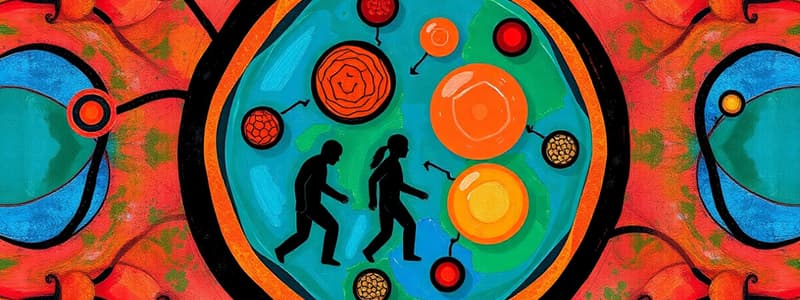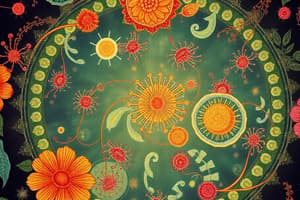Podcast
Questions and Answers
What does taxonomy primarily focus on?
What does taxonomy primarily focus on?
- Analyzing the immune response in humans
- Understanding the energy flow in food webs
- The study of how organisms interact within ecosystems
- Classifying and naming living organisms (correct)
Which of the following is NOT a part of the scientific method?
Which of the following is NOT a part of the scientific method?
- Data Analysis
- Experiment
- Taxonomy (correct)
- Observation
What defines a biome?
What defines a biome?
- Interactions among species in a food web
- The function of the immune system in response to pathogens
- An organism's cellular makeup
- Large-scale ecological communities with specific climate patterns (correct)
Which field of study focuses on how animals function?
Which field of study focuses on how animals function?
What does a hypothesis provide in the context of scientific investigation?
What does a hypothesis provide in the context of scientific investigation?
What is the primary function of carbohydrates in living organisms?
What is the primary function of carbohydrates in living organisms?
Which of the following best describes homeostasis?
Which of the following best describes homeostasis?
What defines a prokaryotic cell?
What defines a prokaryotic cell?
Which of the following processes is essential for the continuation of species?
Which of the following processes is essential for the continuation of species?
What is the role of nucleic acids in living organisms?
What is the role of nucleic acids in living organisms?
Which statement accurately describes evolution?
Which statement accurately describes evolution?
What is the primary function of proteins in biological systems?
What is the primary function of proteins in biological systems?
How does a mutation affect an organism?
How does a mutation affect an organism?
Flashcards
What is a cell?
What is a cell?
The basic unit of life. All living organisms are composed of cells.
What is cell theory?
What is cell theory?
The theory that all living organisms are composed of cells.
What is homeostasis?
What is homeostasis?
The process by which organisms maintain a stable internal environment despite external changes.
What is metabolism?
What is metabolism?
Signup and view all the flashcards
What is reproduction?
What is reproduction?
Signup and view all the flashcards
What is heredity?
What is heredity?
Signup and view all the flashcards
What is DNA?
What is DNA?
Signup and view all the flashcards
What is a mutation?
What is a mutation?
Signup and view all the flashcards
Food Web
Food Web
Signup and view all the flashcards
Taxonomy
Taxonomy
Signup and view all the flashcards
Hypothesis
Hypothesis
Signup and view all the flashcards
Animal Physiology
Animal Physiology
Signup and view all the flashcards
Plant Physiology
Plant Physiology
Signup and view all the flashcards
Study Notes
Introduction to Life Science
- Life science studies living organisms and their interactions
- Includes biology, zoology, botany, microbiology, genetics, and ecology
Key Concepts in Biology
- Cell Theory: All living things are composed of cells, the basic units of life, carrying out all life processes.
- Evolution: Heritable traits change in populations over generations, driven by natural selection.
- Homeostasis: Maintaining a stable internal environment despite external changes.
- Metabolism: All chemical reactions in an organism, including building (anabolism) and breaking down (catabolism) molecules.
- Reproduction: Organisms produce offspring, essential for species survival.
- Heredity: Traits passed from parents to offspring, governed by genetics.
Biological Molecules
- Carbohydrates: Energy source and structural components (e.g., cellulose). Simple sugars (monosaccharides), complex carbohydrates (polysaccharides).
- Lipids: Energy storage, insulation, and membrane structure. Includes fats, oils, and steroids.
- Proteins: Crucial for structure, function, and regulation. Composed of amino acid chains.
- Nucleic Acids: Carry genetic information (DNA, RNA).
Cell Structure and Function
- Prokaryotic Cells: Lack a nucleus and membrane-bound organelles. Bacteria and archaea.
- Eukaryotic Cells: Contain a nucleus and membrane-bound organelles. Animals, plants, fungi, and protists.
- Organelles: Specialized structures in eukaryotic cells with specific functions. Examples: mitochondria (energy), ribosomes (protein synthesis), endoplasmic reticulum (protein transport).
Genetics
- DNA: Hereditary material, instructions for building and maintaining an organism.
- RNA: Crucial molecule in protein synthesis. Includes mRNA, tRNA, rRNA.
- Gene Expression: Using gene information to produce a functional protein.
- Mutation: DNA sequence changes, can be spontaneous or induced.
Ecology
- Ecosystems: Living organisms interacting with their physical environment.
- Food Webs: Energy flow and interactions among species.
- Biomes: Large-scale ecological communities, characterized by climate and organisms.
Classification of Living Organisms
- Taxonomy: Science of classifying and naming organisms.
- Hierarchical System: Organising organisms into groups based on shared characteristics (domain, kingdom, phylum, class, order, family, genus, species).
Scientific Method
- Observation: Gathering information about the natural world.
- Hypothesis: A testable explanation for an observation.
- Prediction: A statement of what will happen if the hypothesis is correct.
- Experiment: Testing the hypothesis through controlled observation.
- Data Analysis: Evaluating if results support or refute the hypothesis.
Other Important Topics
- Animal Physiology: Animal function (circulation, digestion, respiration).
- Plant Physiology: Plant processes (photosynthesis, water transport).
- Microbiology: Study of microorganisms (bacteria, viruses).
- Immunology: Immune system and its response to pathogens.
Human Biology
- Anatomy: Human body structures.
- Physiology: Human body functions at cellular to organism levels.
- Genetics & Genomics: Studying human diseases and traits.
Studying That Suits You
Use AI to generate personalized quizzes and flashcards to suit your learning preferences.




